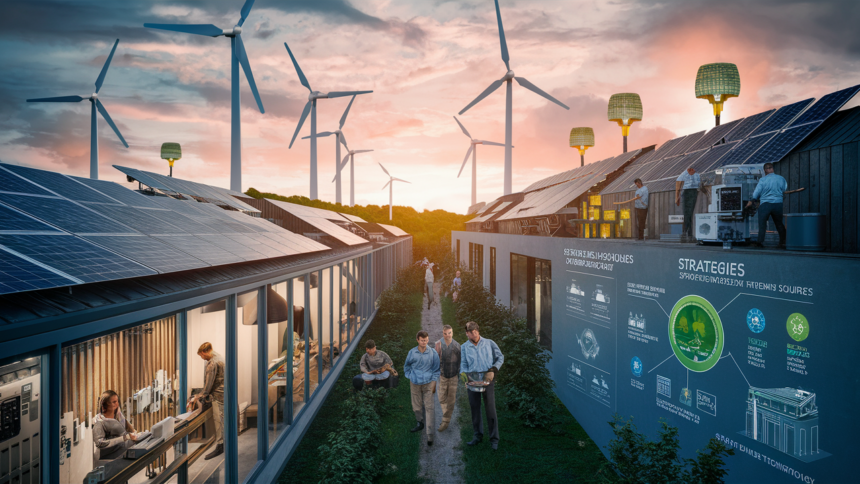As urban centers evolve and the demand for modern, well-equipped workplaces rises, large business parks have become the epicenter of commercial activity. Spread across vast areas and hosting multiple enterprises, these complexes are more than just clusters of office buildings—they are self-sustained ecosystems that require meticulous management to ensure optimal performance, safety, and sustainability.
Among the many challenges faced by operators and developers of business parks, two stand out as both critical and interconnected: maintenance and energy efficiency. Effectively handling these areas not only improves operational reliability and reduces costs but also enhances the environmental impact and appeal of the property to potential tenants.
Why Maintenance Matters in Business Parks
Large business parks are home to a wide array of infrastructure—office buildings, parking lots, landscaped areas, HVAC systems, elevators, power backups, water treatment plants, and more. The complexity of these systems means that reactive maintenance (fixing things only when they break) is not sufficient.
Instead, smart business parks adopt preventive and predictive maintenance practices. These involve scheduled inspections, data-driven diagnostics, and proactive repairs, which together help prevent downtime, reduce operational costs, and extend the lifespan of assets.
Key aspects of effective maintenance in business parks include:
- Routine building checks (plumbing, electrical systems, structural integrity)
- Maintenance of common areas like corridors, cafeterias, green zones, and restrooms
- Timely servicing of elevators, HVAC units, and generators
- Digital maintenance logs and automated work orders
- Vendor management and quality control protocols
When maintenance is streamlined, it ensures that business operations within the park are uninterrupted, tenants are satisfied, and the overall property value is preserved.
The Rising Importance of Energy Efficiency
Energy efficiency is no longer just a buzzword—it’s a core requirement in today’s commercial real estate sector. With environmental regulations tightening and companies aiming to meet ESG (Environmental, Social, Governance) goals, energy-efficient business parks have a clear competitive advantage.
By optimizing energy usage, business parks can significantly cut costs, reduce their carbon footprint, and appeal to eco-conscious tenants.
Best Practices for Energy Efficiency in Business Parks
- Smart Building Management Systems (BMS): A centralized BMS allows facility managers to monitor and control lighting, temperature, ventilation, and other building systems in real-time. These systems use sensors and analytics to optimize energy use based on occupancy and usage patterns.
- LED Lighting & Motion Sensors: Upgrading to LED lighting combined with motion sensors ensures that lights are only used when needed, especially in parking areas, stairwells, and corridors.
- Efficient HVAC Systems: Heating, ventilation, and air conditioning account for a large portion of energy consumption in business parks. Using energy-efficient HVAC units, zoned temperature control, and regular maintenance can lead to substantial savings.
- Solar Power Integration: Many modern business parks are installing rooftop or ground-mounted solar panels to supplement grid power. This reduces dependency on conventional electricity and contributes to long-term cost savings.
- Water and Waste Management: Efficient use of water through rainwater harvesting, water-efficient fixtures, and sewage treatment plants also contributes to sustainability. Similarly, waste segregation and recycling facilities enhance the green credentials of the business park.
- Green Building Certifications: Achieving certifications like LEED (Leadership in Energy and Environmental Design) or IGBC (Indian Green Building Council) standards helps demonstrate a commitment to energy efficiency, which can be a key selling point for premium tenants.
Leveraging Technology and IoT
The Internet of Things (IoT) has transformed how business parks approach both maintenance and energy efficiency. Sensors embedded in lighting, HVAC, and equipment can send real-time data to centralized dashboards. This enables:
- Predictive maintenance using data analytics
- Energy usage tracking for individual tenants
- Smart scheduling of equipment usage based on demand
- Mobile alerts for system failures or anomalies
Adopting proptech solutions allows business parks to automate many routine processes, minimize human error, and make informed decisions backed by data.
The Human Factor: Skilled Teams and Communication
While technology plays a pivotal role, the human element remains crucial. Trained facility management teams are essential to interpret data, respond to emergencies, and ensure that systems are operating efficiently.
Additionally, open communication channels with tenants help identify pain points, schedule maintenance without disruption, and encourage energy-saving behaviors. Regular feedback loops and satisfaction surveys can guide continual improvement efforts.
Conclusion: A Sustainable Future Built on Smart Management
In today’s competitive commercial real estate landscape, large business parks must go beyond aesthetics and amenities. Tenants are increasingly looking for workspaces that are not only functional and well-maintained but also environmentally responsible.
By adopting best practices in maintenance and energy efficiency, business parks can reduce operational costs, enhance tenant satisfaction, and build a resilient infrastructure for the future. In doing so, they not only protect their investment but also contribute meaningfully to global sustainability goals.







